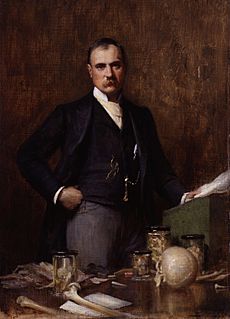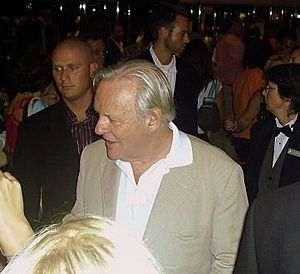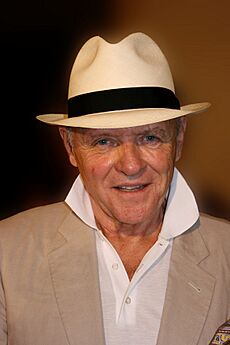Anthony Hopkins facts for kids
Quick facts for kids
Anthony Hopkins
|
|
|---|---|
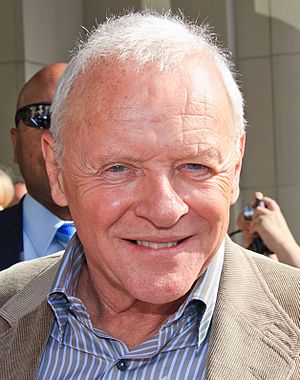
Hopkins in 2010
|
|
| Born |
Philip Anthony Hopkins
31 December 1937 Port Talbot, Glamorgan, Wales
|
| Citizenship |
|
| Alma mater |
|
| Occupation |
|
| Years active | 1960–present |
|
Works
|
Full list |
| Spouse(s) |
|
| Children | 1 |
| Awards | Full list |
Sir Philip Anthony Hopkins (born 31 December 1937) is a famous actor from Wales. He is known for his many roles in movies and on stage. Anthony Hopkins has won many important awards, including two Academy Awards (also known as Oscars). He has also received four BAFTA Awards, two Primetime Emmy Awards, and a Laurence Olivier Award. In 2005, he received the Golden Globe Cecil B. DeMille Award for his long and successful career. In 2008, he was given the BAFTA Fellowship, which is a special award for lifetime achievement. In 1993, Queen Elizabeth II made him a knight for his contributions to drama.
Anthony Hopkins graduated from the Royal Welsh College of Music & Drama in 1957. He then studied acting at RADA (the Royal Academy of Dramatic Art) in London. A famous actor named Laurence Olivier noticed his talent and invited him to join the Royal National Theatre in 1965. He performed in many plays there, including King Lear, which was his favorite Shakespeare play. His last stage play was M. Butterfly in 1989.
Hopkins's early film roles include The Lion in Winter (1968) and The Elephant Man (1980). He won two Academy Awards for Best Actor. The first was for playing Hannibal Lecter in The Silence of the Lambs (1991). The second was for playing an older man with memory loss in The Father (2020). With this award, he became the oldest actor to win a Best Actor Oscar. Some of his other well-known films include The Remains of the Day (1993), The Mask of Zorro (1998), and the Marvel Thor movies (2011–2017).
For his work on television, Hopkins won a British Academy Television Award for Best Actor for War and Peace (1972). He also won two Primetime Emmy Awards for his roles in The Lindbergh Kidnapping Case (1976) and The Bunker (1981). He also appeared in the HBO series Westworld (2016–2018).
Contents
Early Life and Education
Philip Anthony Hopkins was born in Port Talbot, Wales, on 31 December 1937. His mother was Annie Muriel and his father was Richard Arthur Hopkins, a baker. Anthony Hopkins has said that his father's hard-working values always guided his life.
When he was a student, he preferred art, like painting and playing the piano, over his schoolwork. In 1949, his parents sent him to West Monmouth School to help him focus. He later attended Cowbridge Grammar School. In an interview, he shared that he felt he was not a good learner and thought he was "stupid" when he was young.
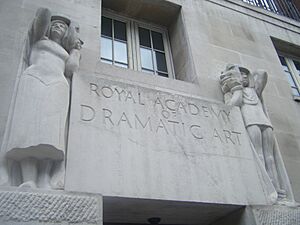
Anthony Hopkins was inspired by another Welsh actor, Richard Burton, whom he met when he was 15. He enrolled at the Royal Welsh College of Music & Drama in Cardiff and graduated in 1957. He then served two years in the British Army before moving to London to study at RADA. He graduated from RADA in 1963.
Acting Career
Early Theatre and Film Roles (1960–1979)
Hopkins began his acting career on stage in 1960. In 1965, Laurence Olivier invited him to join the Royal National Theatre in London. Hopkins became Olivier's backup actor. He stepped in for Olivier during a play in 1967 when Olivier became ill. Olivier later praised Hopkins, saying he was a "young actor... of exceptional promise."
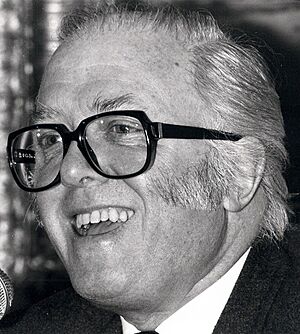
Hopkins first appeared on television in 1967. His first main film role was in a short film called Changes in 1964. In 1968, he gained recognition for his role as Richard the Lionheart in The Lion in Winter. This role earned him a nomination for a BAFTA Award. He played Charles Dickens in a BBC TV film in 1970 and Pierre Bezukhov in the BBC series War and Peace in 1972. For War and Peace, he won a British Academy Television Award.
He worked with director Richard Attenborough five times. Their first movie together was Young Winston (1972), where Hopkins played British politician David Lloyd George. In 1974, Hopkins starred in the Broadway play Equus, for which he received an award. In 1977, he played a British Army officer in Attenborough's World War II film A Bridge Too Far. He also starred in Attenborough's psychological film Magic in 1978.
National Theatre and Growing Fame (1980–1989)
In 1980, Hopkins starred in David Lynch's film The Elephant Man. He played Sir Frederick Treves, a doctor who cares for Joseph Merrick, a man with severe physical differences. The film was highly praised and nominated for eight Academy Awards. In 1981, he played Adolf Hitler in the TV film The Bunker, winning a Primetime Emmy Award for his performance.
In 1984, he starred with Mel Gibson in The Bounty, playing Captain William Bligh. The next year, he played Quasimodo in the TV film The Hunchback of Notre Dame (1982). In 1985, Hopkins received an award for his role in the play Pravda at the National Theatre. He also starred in a production of King Lear in 1986 and Antony and Cleopatra in 1987. His last stage performance was in M. Butterfly in 1989.
Becoming a Film Star (1990–1999)
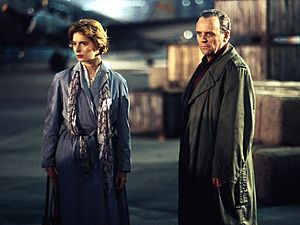
Anthony Hopkins became widely famous for his role as the character Hannibal Lecter in The Silence of the Lambs (1991). He won the Academy Award for Best Actor for this role. The film also won Best Picture, and his co-star Jodie Foster won Best Actress. Hopkins also won his first BAFTA for Best Actor for this film. He played Lecter two more times in Hannibal (2001) and Red Dragon (2002). The American Film Institute named his portrayal of Lecter as the number-one film villain.
In 1992, Hopkins played Professor Van Helsing in Bram Stoker's Dracula. He also appeared in Howards End (1992) and reunited with co-star Emma Thompson in The Remains of the Day (1993). For his role as the butler Stevens in The Remains of the Day, he was nominated for an Academy Award and won a BAFTA Award.
In 1993, Hopkins played C. S. Lewis in the film Shadowlands, earning another BAFTA nomination. He also worked with a trained bear named Bart in two films: Legends of the Fall (1994) and The Edge (1997). In 1998, he was Britain's highest-paid actor, starring in The Mask of Zorro and Meet Joe Black.
Established Actor (2000–2015)
In 2000, Hopkins narrated How the Grinch Stole Christmas. He then returned as Hannibal Lecter in Hannibal (2001) and Red Dragon (2002). These films were very popular at the box office.
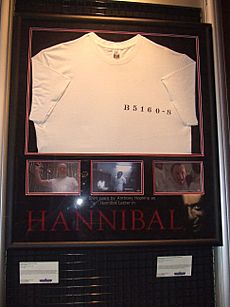
In 2003, Anthony Hopkins received a star on the Hollywood Walk of Fame. He has said that his favorite role was playing Burt Munro in the 2005 film The World's Fastest Indian. In 2006, he received the Golden Globe Cecil B. DeMille Award for his lifetime achievements in film. In 2008, he was given the BAFTA Fellowship, the highest award from the British Film Academy.
In 2011, Hopkins played a priest in the film The Rite. He also played Odin, the king of Asgard, in the Marvel Comics film Thor (2011). He continued this role in Thor: The Dark World (2013) and Thor: Ragnarok (2017). In 2012, he played Alfred Hitchcock in the movie Hitchcock. He also appeared in Red 2 (2013) and Noah (2014). In 2017, he was in Transformers: The Last Knight.
In 2015, Hopkins starred as Sir in the BBC Two production of The Dresser alongside Ian McKellen. He described this role as a highlight of his life.
Recent Career (2016–Present)
Starting in 2016, Hopkins starred as Robert Ford in the HBO science fiction series Westworld. He received an Emmy nomination for his performance. In 2018, he played Lear in the television film King Lear, which was broadcast on BBC Two. Critics praised his performance as "devastating".
In 2019, Hopkins played Pope Benedict XVI in the film The Two Popes, acting alongside Jonathan Pryce as Pope Francis. The film was highly praised, and both Hopkins and Pryce received nominations for their acting at major awards.
In 2020, Hopkins starred in The Father, playing a man dealing with Alzheimer's disease. The film received great reviews, and many critics called his performance outstanding. He won his second Academy Award for Best Actor for this role, becoming the oldest person to win an acting Oscar. He accepted the award from Wales, his home country.
In 2022, he appeared in Armageddon Time and reunited with the director of The Father for the film The Son. In 2023, Hopkins starred as humanitarian Nicholas Winton in One Life and played Sigmund Freud in Freud's Last Session. He also appeared in the Netflix science fiction film Rebel Moon. In 2024, Hopkins played Herod the Great in the Netflix film Mary.
Other Activities
Supporting Charities and Causes
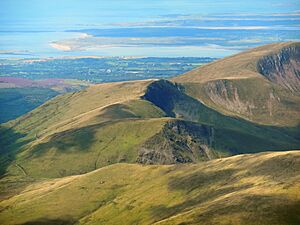
Anthony Hopkins supports many charities. He became the President of the National Trust's Snowdonia Appeal, which raises money to protect Snowdonia National Park in Wales. In 1998, he donated a large sum of money to help the Trust buy parts of Snowdon. Because of his help, he was named one of the 100 Welsh Heroes in 2004.
He has been a supporter of the YMCA in his hometown of Port Talbot for over 20 years. He also volunteers as a teacher at the Ruskin School of Acting in California. Hopkins is a member of the environmental group Greenpeace and has spoken out about protecting whales. He also supports RAPt (Rehabilitation for Addicted Prisoners Trust), which helps people overcome challenges.
Hopkins is a fan of the Welsh comedian Tommy Cooper. In 2008, he helped unveil a statue of Cooper in his hometown and even performed a short comedy routine.
Music Composing
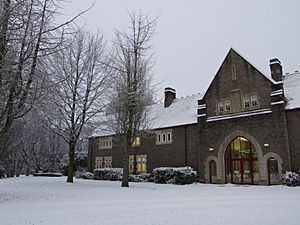
Anthony Hopkins has composed music throughout his life. He once said that if he had been better at school, he would have gone to music college. In 1986, he released a song called "Distant Star."
In 2007, he announced he would take a break from acting to tour the world with his music. He has written music for concerts, including The Masque of Time, which was performed by the Dallas Symphony Orchestra in 2008.
In 2011, the famous violinist André Rieu released an album that included a waltz Hopkins had composed in 1964. Hopkins had never heard his piece, "And the Waltz Goes On", performed until Rieu's orchestra played it in Vienna. In 2012, Hopkins released his own album of classical music called Composer. It features nine of his original works and film scores.
Directing Films
In 1990, Hopkins directed a film about the Welsh poet Dylan Thomas, called Dylan Thomas: Return Journey. This was his first time directing a film. In 1995, he directed August, which was based on a play and set in Wales. His first original screenplay, an experimental film called Slipstream, which he also directed and scored, premiered in 2007. In 1997, Hopkins narrated a BBC nature documentary series called Killing for a Living.
Personal Life
Anthony Hopkins lives in Malibu, California. He became a naturalized American citizen in 2000, but he still keeps his British citizenship. He has said, "I have dual citizenship; it just so happens I live in America."
Hopkins has been married three times. He married Petronella Barker from 1966 to 1972, Jennifer Lynton from 1973 to 2002, and Stella Arroyave since 2003. He credits Stella with helping him through difficult times. He has one daughter from his first marriage.
He has been sober since 1975. In 2017, he shared that he was diagnosed with Asperger syndrome a few years earlier, describing it as a "great gift." He has a pet cat named Niblo. He also follows a pescatarian diet, meaning he eats fish but no other meat.
Acting Credits and Awards
Anthony Hopkins was made a CBE in 1987 and was knighted by Queen Elizabeth II in 1993 for his contributions to the arts. He has also received honorary degrees from universities. In 1996, he was made a special citizen of his hometown, Port Talbot.
He has received many awards for his acting, including two Academy Awards, four BAFTA Awards, two Primetime Emmy Awards, and a Laurence Olivier Award. He has also been nominated for eight Golden Globe Awards and seven Screen Actors Guild Awards. When he won the Oscar for Best Actor for The Father (2020), he became the oldest person to be nominated for and win that award.
Hopkins has also received special lifetime achievement awards for his work in film and television. In 2006, he received the Golden Globe Cecil B. DeMille Award. In 2008, he was given the BAFTA Fellowship for his lifetime achievements. He also has a star on the Hollywood Walk of Fame since 2003.
See also
 In Spanish: Anthony Hopkins para niños
In Spanish: Anthony Hopkins para niños
- List of oldest and youngest Academy Award winners and nominees
- List of British Academy Award nominees and winners
- List of actors with Academy Awards nominations
- List of actors with two or more Academy Award nominations in acting categories
- List of actors with two or more Academy Awards in acting categories
 | Valerie Thomas |
 | Frederick McKinley Jones |
 | George Edward Alcorn Jr. |
 | Thomas Mensah |


